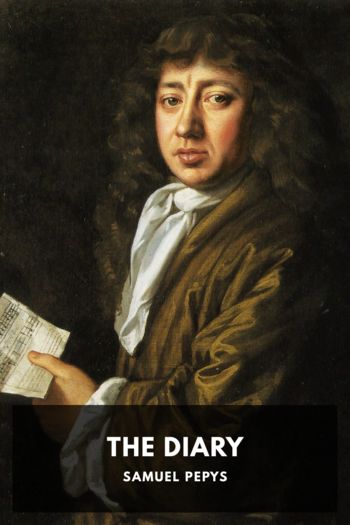The Diary - Samuel Pepys (red white and royal blue hardcover txt) 📗

- Author: Samuel Pepys
Book online «The Diary - Samuel Pepys (red white and royal blue hardcover txt) 📗». Author Samuel Pepys
Mend his bad fortune by his wiser play.” Wit’s Recre., i. 250, reprint, 1817
↩
Dr. Johnson was puzzled by the following passage in The Merry Wives of Windsor, act v, sc. 3: “Divide me like a bribe-buck, each a haunch. I will keep the sides to myself; my shoulders for the fellow of this walk.” If he could have read the account of Sir William Hickes’s dinner, he would at once have understood the allusion to the keeper’s perquisites of the shoulders of all deer killed in his walk. —B. ↩
Epping Forest, of which he was Ranger. ↩
Daughter of William Sheldon. ↩
A mistake for thirty-five. ↩
There is a token of the Angel Tavern at Tower Hill, dated 1649. The alehouse was probably the Rose and Crown at Tower Stairs, of which there is also a token. (See Boyne’s Tokens, ed. Williamson, vol. i, p. 775.) ↩
See ante, on the 10th of this month. ↩
Sidney Montagu, brother of Edward, Earl of Sandwich, was with his niece, Lady Jemima Carteret. Scot’s Hall belonged to her husband’s brother-in-law, Sir Thomas Scott. ↩
Thomas Plume, D.D., vicar of Greenwich, 1663, and installed Archdeacon of Rochester, 1679. Died November 20th, 1704, and buried in Longfield churchyard. ↩
Lord Sandwich was not so successful in convincing other people as to the propriety of his conduct at Bergen as he was with Pepys. ↩
There is a shorthand journal of proceedings relating to Pepys’s purchase of some East India prize goods among the Rawlinson MSS. in the Bodleian Library. ↩
This was Nonsuch. When proclamation was made, September 26th, that the courts were to be removed from Westminster to Oxford, it was announced that the Exchequer was to remain at Nonsuch. There is no authority for attributing any of the work to either Holbein or Rubens. See ante, August 11th, and note 1887. ↩
Cribbage. ↩
The same discovery was made in 1789, in digging the Brunswick Dock, also at Blackwall, and elsewhere in the neighbourhood. See Notes and Queries, 1st series, vol. viii, p. 263. —M. B. ↩
Sir Edward Montagu, Chief Justice of the King’s Bench, 1539–45 Chief Justice of the Common Pleas, 1545–53. He died February 10th, 1556–57. ↩
These are the words in the MS., and not “his son and the Lord Montagu,” as in some former editions. Pepys seems to have written Lord Montagu by mistake for Sir Edward Montagu.
Pedigree of the Earl of Sandwich
—M. B.
Lord Sandwich speaks of five [four?] generations, in which the number of descendants might have multiplied ad infinitum. “When King James came into England,” observes Ward, in his Diary, p. 170, “he was ffeasted at Boughton, by Sir Edward Montagu, and his six sonnes brought upp the six first dishes; three of them after were lords, and three more knights—Sir Walter Montagu, Sir Sydney, and Sir Charles, whose daughter Lady Hatton is.” Fuller, also, in his Worthies, records that “Hester Sandys, the wife of Sir Thomas Temple, of Stowe, Bart., had four sons and nine daughters, which lived to be married, and so exceedingly multiplied, that she saw seven hundred extracted from her body. Besides, there was a new generation of marriageable females just at her death” (see Collins’s Peerage, vol. ii, p. 411). When Charles, thirteenth Duke of Norfolk, had completed his restoration of Arundel Castle, he proposed to entertain all the descendants of his ancestor, Jock of Norfolk, who fell at Bosworth Field; but gave up on his intention on finding that he should have to invite upwards of six thousand persons. —B. ↩
Master of the Requests to Charles I. ↩
In the British Museum, Egerton MS., 861, is an account showing the value of all prizes taken during the war with the Dutch; distinguishing the vessels, their goods, the ports at which they were condemned, and the parties to whose accounts the amounts were debited. —B. ↩
This picture by Mrs. Pepys may have given trouble when Pepys was unjustifiably attacked for having Popish pictures in his house. ↩
The Court was then held at Salisbury, where the King and Queen removed on July 27th. ↩
William Wardour was appointed Clerk of the Pells in 1660. ↩
He had been a farmer of the excise and customs before the Restoration (see note 1531). ↩
John Temple and John Seale were goldsmiths at the Three Tuns in Lombard Street (see A Collection of the Names of the Merchants Living in and About the City of London, 1677. 12mo.). ↩
Christian, daughter of Sir Alexander Urquhart of Cromarty. —B. ↩
See August 16th, 1665. ↩
Instructions concerning erecting





Comments (0)